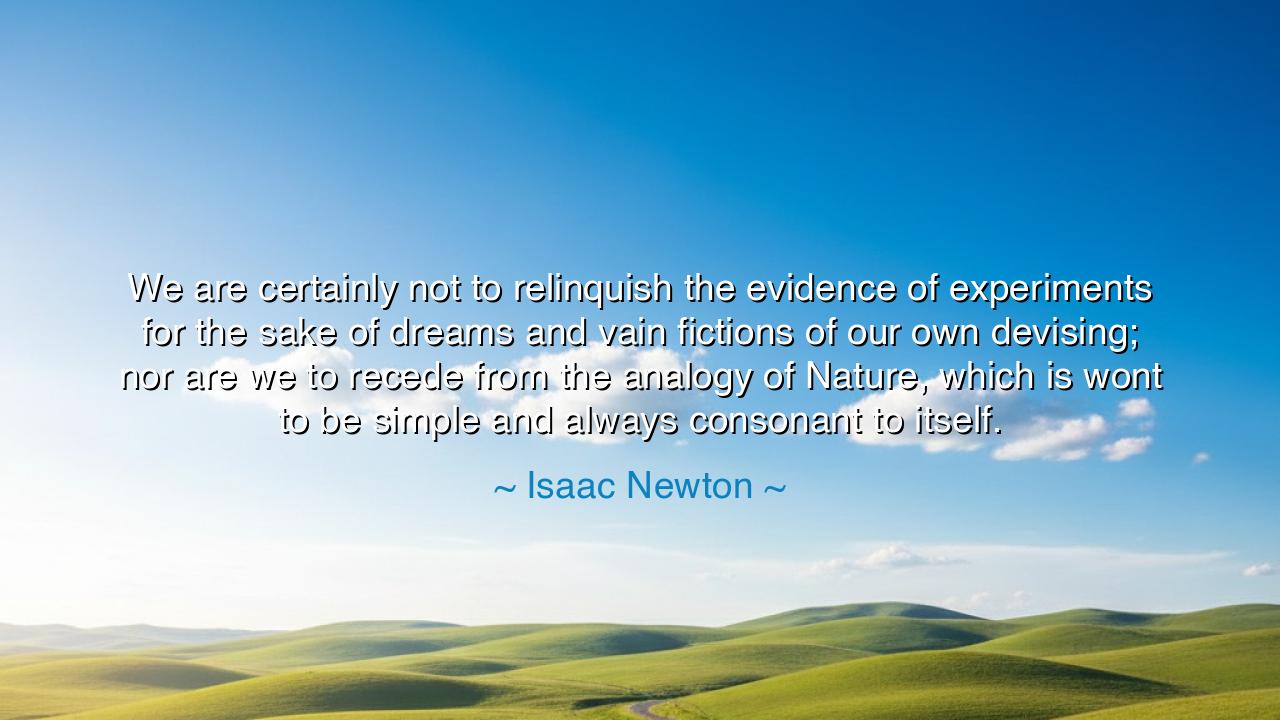
We are certainly not to relinquish the evidence of experiments
We are certainly not to relinquish the evidence of experiments for the sake of dreams and vain fictions of our own devising; nor are we to recede from the analogy of Nature, which is wont to be simple and always consonant to itself.






When Isaac Newton, the father of modern science, wrote, “We are certainly not to relinquish the evidence of experiments for the sake of dreams and vain fictions of our own devising; nor are we to recede from the analogy of Nature, which is wont to be simple and always consonant to itself,” he spoke with the solemn authority of one who had looked deeply into the structure of creation. His words were not only a defense of science, but a manifesto of truth-seeking—a warning to future generations not to abandon the firm ground of evidence for the shimmering illusions of imagination unanchored in reality.
The origin of this quote lies in the preface to Newton’s Opticks, published in 1704, a work that sought to unveil the hidden order of light and color. The seventeenth century was an age when philosophy and superstition still intertwined, when many scholars sought to explain the universe through mystical speculation rather than experiment. Against this backdrop, Newton stood as a revolutionary. He demanded that knowledge be founded not on dream or dogma, but upon observation, testing, and the consistency of Nature’s laws. In this declaration, Newton rebuked those who would forsake the evidence of their senses for the fantasies of their own invention—a temptation as ancient as humanity itself.
To the ancients, this struggle between truth and illusion was already known. The Greek philosopher Plato, in his allegory of the cave, spoke of men mistaking shadows for reality, their eyes blinded by the light of truth when first exposed to it. Newton’s voice is the echo of that same ancient call—to turn away from shadows, from the “vain fictions of our own devising,” and to walk in the brightness of reason. Yet unlike Plato, who sought truth through the realm of ideas, Newton rooted his wisdom in the material world. To him, Nature was the book of God, and its pages could be read by those humble enough to observe and patient enough to measure.
There is a story from Newton’s own life that embodies this spirit. When he first began his experiments with prisms, many scholars mocked him. They held fast to Aristotle’s ancient notion that white light was pure and unchanging, that colors were mere distortions. But Newton, guided not by tradition but by experiment, proved that white light itself was composed of all colors blended together. The discovery was revolutionary. It revealed that Nature’s simplicity was not in uniformity, but in the elegant harmony of complexity. Through careful observation and reason, he uncovered truth where others saw mystery. Thus, Newton lived the very creed he preached: never to relinquish evidence for dreams, but to follow Nature’s analogies faithfully, knowing she is “simple and consonant to herself.”
Newton’s warning extends beyond science—it reaches into the soul of civilization. For even now, in the modern age, humanity often prefers illusion to reality. People craft comforting fictions—political, spiritual, or personal—and cling to them despite the evidence of their eyes. Newton reminds us that to build knowledge upon fantasy is to build a tower upon sand. The pursuit of truth, whether in science or in life, requires humility—the willingness to be proven wrong, to surrender pride before the quiet authority of fact. This humility is not weakness; it is the beginning of wisdom.
Yet Newton’s words are not a condemnation of dreaming itself. The dream, when guided by evidence, becomes vision; when freed from discipline, it becomes delusion. The greatest minds of history—Galileo, Da Vinci, Einstein—all dreamed, but their dreams were married to reality. Newton himself was no stranger to wonder; his genius lay in joining wonder with method, imagination with proof. Thus, his teaching is not to forsake the imagination, but to purify it through the fire of experiment—to make it serve truth rather than vanity.
The lesson, therefore, is timeless: reverence reality, and let Nature be your teacher. In all pursuits—whether of science, art, or understanding—test what you believe against what is true. Let evidence, not ego, be your compass. When faced with the temptation to choose comforting illusion over difficult fact, remember Newton’s wisdom: the universe is simple, harmonious, and self-consistent. Those who listen to it honestly will find its beauty revealed to them in time.
So, my children of thought, take these words to heart. Do not abandon evidence for dreams, nor truth for desire. Let your imagination soar, but let reason be the wind beneath its wings. For only when knowledge and wonder walk hand in hand can humanity rise to its fullest height—where, as Newton himself once said, we stand like children on the shore of an infinite sea, gathering the small shells of truth, and gazing in awe upon the vast ocean of what is yet to be discovered.






AAdministratorAdministrator
Welcome, honored guests. Please leave a comment, we will respond soon